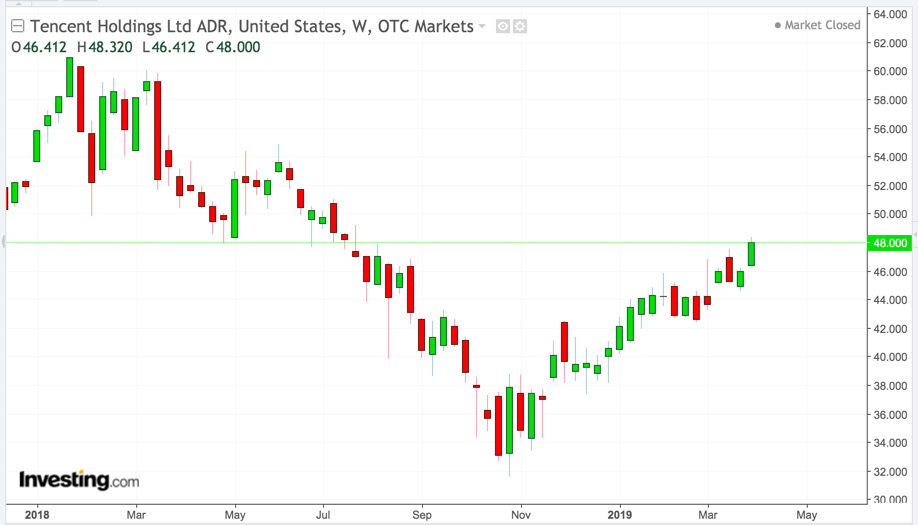Tencent Holdings (OTC:TCEHY) went through a lot of pain last year. Its lucrative gaming business was hit by Chinese government controls, the macro environment in which it operates worsened and companies markedly slowed their spending, hurting its advertising business.
The company, which is known as China’s Facebook (NASDAQ:FB), had much of that negativity baked into its Q4 numbers, released on March 21. Net profit for the three months through December plunged 32% compared with the same period a year ago. That was the worst showing since its initial public offering in 2004, reflecting the impact from a government freeze on the approval for new games in 2018 due to rising levels of myopia among children and teenagers in China, the world's biggest gaming market.
But there are now signs that the worst may be over for Tencent and its investors. First, China began approving new games, a move which will improve the company’s bottom line as it will allow Tencent to monetize its blockbuster titles, such as “PlayerUnknown’s Battlegrounds” and “Fortnite.” This is a significant development: the company generates more than 40% of its sales and most of its profits from the gaming industry.
Tencent also relies on new games to bring in and retain users on its WeChat messaging service, over which it sells in-game items and advertising to a billion-plus potential customers.
Improving Macro Environment
Encouraged by these positive developments, investors are bidding up the company’s shares this year. Trading at $48 in New York at yesterday's close, Tencent stock is up 22% this year, after losing about a quarter of its value in 2018.

Tencent’s stock recovery also coincides with some positive developments on the macro front. The U.S. and China are getting closer to a possible deal that could end the trade war between the two largest economies. And there are signs that the Chinese economy will respond positively to the government’s stimulus package, aimed at fueling growth via tax cuts and boosting lending to small and private companies.
Despite its disappointing quarterly earnings, the company’s underlying business strength is solid and management is well on track to diversify its revenue base away from gaming. The operator of the popular WeChat app, with over 1 billion monthly active users, has a dynamic online ecosystem which is unparalleled and hard to match. With video blogging, instant messaging, plus a payment app all rolled into one, Tencent offers an attractive opportunity to investors who want some exposure to Chinese internet economy.
According to a recent note by Nomura Securities, Tencent's WeChat business has the potential to earn more in ad revenue. “We believe WeChat remains under-monetized in the ad business,” Nomura analysts Jialong Shi, Carson Lo and Michael Tam said in a note, cited by Reuters.
“The rising popularity of mini programs should enable WeChat to gain more ad budgets from those service providers such as OTA (online travel agencies), e-commerce and education advertisers, once these service providers are migrating part or entire of their businesses into WeChat through mini programs, ” they wrote. Mini-programs are applications within WeChat that allow consumers to access services ranging from banking to ride-hailing.
Tencent’s investments to capture opportunities in what founder Pony Ma calls the emergence of an “industrial internet,” are further drivers for future growth. As part of its diversification strategy, in September, the company set up a smart industries division to focus on artificial intelligence, cloud services, big data and security.
Bottom Line
Even after their strong rebound in 2019, Tencent shares are still a good buy for long-term investors. The company’s long-term prospects are bright after the temporary setback of the past year. Its gaming pipeline is strong and it’s well on track to broaden its revenue base. Tencent has a business model which is proving much more durable than many of its western peers'.
